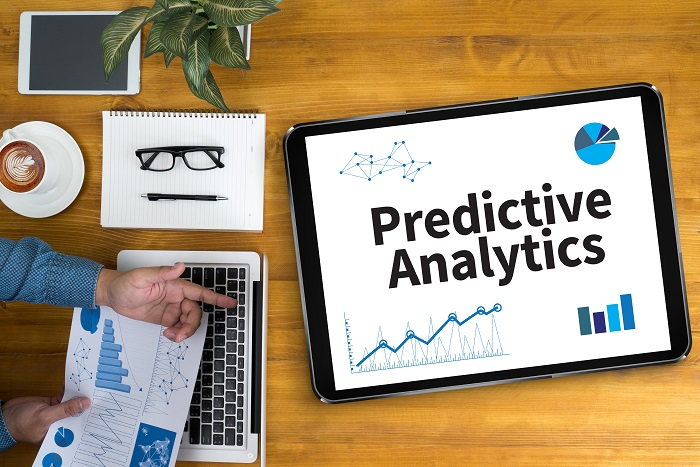
 Data Structure
Data Structure Networking
Networking RDBMS
RDBMS Operating System
Operating System Java
Java MS Excel
MS Excel iOS
iOS HTML
HTML CSS
CSS Android
Android Python
Python C Programming
C Programming C++
C++ C#
C# MongoDB
MongoDB MySQL
MySQL Javascript
Javascript PHP
PHP
- Selected Reading
- UPSC IAS Exams Notes
- Developer's Best Practices
- Questions and Answers
- Effective Resume Writing
- HR Interview Questions
- Computer Glossary
- Who is Who
What is Predictive Analytics?
Predictive analytics refers to the application of statistics and modeling methods to forecast future results and performance. In order to determine if specific patterns in the data are likely to repeat, predictive analytics evaluates trends in both historical and present data. This enables businesses and investors to alter resource allocations to profit from expected future occurrences. Predictive analytics can also be utilized to lower risk and boost operational effectiveness.
Predictive analytics is a type of technology that creates forecasts for future unknowns. These judgments are made using a variety of techniques, including artificial intelligence (AI), data mining, machine learning, modeling, and statistics. Data mining is one method that looks for patterns in a lot of data. For text analysis, the same is true, but not for lengthy text passages.
Applications of numerous kinds use predictive models, including ?
Weather predictions
Design a video game
Audio from a phone message to a text
Customer support
Evolution of investment portfolio
All of the applications above, help to forecast future data by using descriptive statistical models of current data.

It also aids in creating marketing strategies and revenue projections for the company. Additionally, it aids in a company's survival, particularly in industries with fierce competition like healthcare and retail. Investors and financial professionals can utilize this technology to create investment portfolios and lower risk. These models pinpoint statistical trends, correlations, and organizational characteristics. From this, it is possible to infer how changes to the fundamental processes that produce the data have an impact on the outcomes.
These descriptive models serve as the foundation for predictive models, which use historical data to calculate the likelihood of specific future events given either the current situation or a set of anticipated future circumstances. Data is the backbone of business analytics and is increasingly what keeps businesses moving forward. Both large and small businesses use the data they produce and gather from internal and external sources.
Potential Applications of Predictive Analytics
In many industries, predictive analytics is believed to be also used as a great decision-making tool.
Forecasting
In manufacturing practices, forecasting is very essential as it assures the supply chain's best use of its resources. Whether it's inventory control or the shop floor, accurate forecasting is essential for the supply chain's key components to function.
The quality of the data utilized for such forecasts is frequently improved and cleaned up using predictive modeling. Modeling enables the structure to receive additional data, including information received from operations that interact with customers, resulting in more precise estimates.
Credit
Predictive analytics is widely used in credit rating. When an individual or entity, seeks a loan, information about the borrower's creditworthiness?which shares traits with the applicant's credit history-is used to estimate the likelihood that the loan will not be disbursed as agreed.
Underwriting
In underwriting, data and predictive analytics are crucial. Depending on the present risk bucket of comparable policyholders and previous happenings that resulted in payouts, insurers utilize policyholder risk pools to estimate the possibility that they will have to pay future claims. will be examined. Actuaries frequently utilize predictive models that take into account aspects of prior policyholder and claims data.
Marketing
Experts in the area take into account how consumers have reacted to the overall state of the economy when creating new commercials. We can predict whether the current product mix will encourage customer purchases based on these demographic trends. Conversely, active traders examine a variety of indications based on historical data when determining whether to purchase or sell a security. Using moving averages, bands, and breakpoints based on prior data, forecast future price changes.
Examples of Predictive Analytics
Determining the Count of Employees Needed in Entertainment and Hospitality
One example being studied in Business Analytics is how Caesars Entertainment, a casino and hotel operator, uses predictive analytics to identify the staffing requirements of a venue at a specific moment in time.
Numerous factors affect customer traffic in the hotel and entertainment industries. How many employees a hotel or venue needs at any given time is impacted by all of these. Understaffing can result in a bad customer experience, overworked employees, and expensive errors, whereas overstaffing is expensive.
In order to forecast the number of hotel check-ins on a particular day, the team developed a multiple regression model that takes into consideration a variety of factors. By employing this strategy and making every effort to staff their hotels and casinos, Caesars was able to avoid overstaffing.
Used in Marketing as Behavioral Targeting
The development of content, promotion, and marketing techniques to reach prospective clients wherever they may use consumer data extensively. Predictive analytics can be utilized to forecast future events by examining historical behavioral data.
Predictive analytics can be used by marketing to identify seasonal market trends and plan promotions appropriately.
Additionally, past behavior data aids in forecasting the possibility that prospects would transition from awareness to purchase. To find the number of interesting items that accurately forecast a prospect's probability of making a future purchase, for instance, one linear regression model can be utilized. With this insight, you may create tailored advertising for various customer lifecycle stages.
Manufacturing: Avert Faulty Products
Even while the aforementioned example employs predictive analytics to make decisions based on expected outcomes, the same technology can also be utilized to avert undesirable or disastrous outcomes. increase. Algorithms can be trained on previous data, for instance, to precisely forecast when machines on a production line are likely to break down.
Algorithms are activated to notify staff members who really can stop the machine when conditions for an impending fault are satisfied. The corporation might be able to avoid spending hundreds, if not millions, on damaged goods and repairs. In contrast to months or years past, this study forecasts outage situations for today.
Some algorithms even suggest solutions and improvements to prevent future issues, boost productivity, and conserve resources like time, wealth, and energy. Prescriptive analytics is demonstrated in this case. Most frequently, a combination of one or more methods of analysis is employed to address an issue.
Example of a Brand using Predictive Analytics

Netflix
For companies like Netflix, data collection is crucial. Based on their clients' actions and previous viewing patterns, they collect data from them. Based on your tastes, they utilize this information to generate recommendations. The "since you were viewing..." list in their subscription is based on this.
Conclusion
Predictive analytics has a lot of benefits. As previously said, applying this kind of study aids businesses in making predictions when there are no alternative (and evident) solutions accessible. Models can be used by investors, financial experts, and company executives to lower risk. For instance, using certain models, investors and their advisors may develop investment portfolios that reduce risk to investors while taking into account various elements including age, capital, and ambitions. Models might help you save a lot of money on expenses. Before a product is released, businesses can predict its chances of success or failure. Alternatively, before the manufacturing process even starts, predictive technologies can be tilized to gain funding for production improvements.
Predictive analytics can give you the information you need to move forward in any sector. Establishing a foundation of analytical abilities is beneficial whether you're making investment decisions, creating marketing techniques, modifying operations, or lifesaving.

